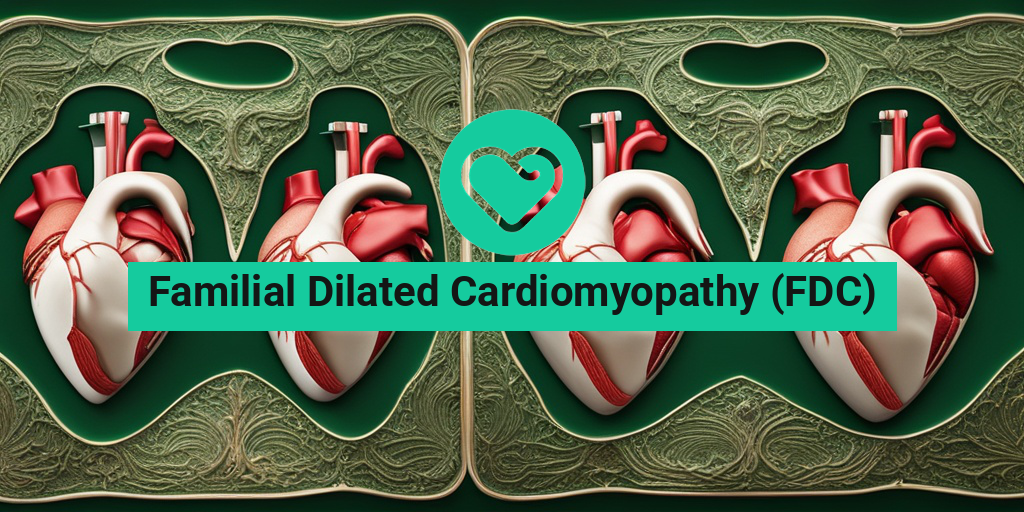“`html
What Is Familial Dilated Cardiomyopathy?
Familial Dilated Cardiomyopathy (FDC) is a genetic heart condition that primarily affects the heart muscle, leading to its enlargement and impaired function. This condition is a type of dilated cardiomyopathy, which means that the heart’s chambers become dilated, or enlarged, making it difficult for the heart to pump blood effectively. FDC is inherited, meaning it can run in families, and is often caused by mutations in specific genes that are crucial for heart muscle function.
Understanding the Genetics of FDC
The genetic basis of Familial Dilated Cardiomyopathy is complex. It can be caused by mutations in various genes, including those that encode proteins essential for the structure and function of heart muscle cells. Some of the most commonly implicated genes include:
- TTN (Titin): This gene is vital for the elasticity and contraction of heart muscle.
- LMNA (Lamin A/C): Mutations here can affect the structural integrity of the heart cells.
- MYH7 (Beta-myosin heavy chain): This gene plays a crucial role in muscle contraction.
Because FDC is hereditary, individuals with a family history of the condition should consider genetic counseling and testing. Early detection can lead to better management and treatment options.
Prevalence and Risk Factors
Familial Dilated Cardiomyopathy is relatively rare, affecting approximately 1 in 2,500 individuals. However, its prevalence may be higher in certain populations. Risk factors include:
- Family History: A direct relative with FDC significantly increases your risk.
- Age: Symptoms often appear in adulthood, typically between the ages of 20 and 60.
- Gender: Males are more frequently affected than females.
Understanding these risk factors can help in early diagnosis and intervention.
FDC Symptoms
The symptoms of Familial Dilated Cardiomyopathy can vary widely among individuals, and some may not experience any symptoms until the condition has progressed. Common symptoms include:
- Shortness of Breath: This may occur during physical activity or even at rest.
- Fatigue: A general feeling of tiredness that doesn’t improve with rest.
- Swelling: Edema in the legs, ankles, or abdomen due to fluid retention.
- Palpitations: Irregular heartbeats or a sensation of a racing heart.
- Chest Pain: Discomfort or pain in the chest, which may be mistaken for other conditions.
It’s essential to recognize these symptoms early, as they can lead to serious complications, including heart failure or arrhythmias. If you or a loved one experiences any of these symptoms, it’s crucial to seek medical attention promptly.
Diagnosis and Management
Diagnosing Familial Dilated Cardiomyopathy typically involves a combination of medical history, physical examination, and diagnostic tests such as:
- Echocardiogram: This ultrasound test provides images of the heart’s structure and function.
- Electrocardiogram (ECG): This test measures the electrical activity of the heart.
- Genetic Testing: Identifying specific gene mutations can confirm a diagnosis of FDC.
Management of FDC often includes lifestyle changes, medications, and in some cases, surgical interventions. Medications may include:
- ACE Inhibitors: Help relax blood vessels and lower blood pressure.
- Beta-Blockers: Reduce heart rate and improve heart function.
- Diuretics: Help reduce fluid buildup in the body.
For more comprehensive information and resources on managing Familial Dilated Cardiomyopathy, consider visiting Yesil Health AI, where you can find evidence-based health answers tailored to your needs.
In conclusion, Familial Dilated Cardiomyopathy is a serious condition that requires awareness and proactive management. Understanding the symptoms and seeking timely medical advice can significantly improve outcomes for those affected. 💖
“`

“`html
Familial Dilated Cardiomyopathy (FDC) Causes and Risk Factors
Familial Dilated Cardiomyopathy (FDC) is a genetic condition that affects the heart muscle, leading to its enlargement and impaired function. Understanding the causes and risk factors associated with FDC is crucial for early detection and management.
Genetic Causes of FDC
The primary cause of FDC is genetic mutations that affect the proteins responsible for heart muscle function. These mutations can be inherited in various patterns, including:
- Autosomal Dominant: A single copy of the mutated gene from one parent can cause the disorder.
- Autosomal Recessive: Two copies of the mutated gene, one from each parent, are required for the condition to manifest.
- X-Linked: Mutations on the X chromosome can affect males more severely, while females may be carriers.
Some of the most common genes associated with FDC include TTN, LMNA, and MYH7. Genetic testing can help identify these mutations, providing valuable information for family members at risk.
Environmental and Lifestyle Factors
While genetics play a significant role in FDC, certain environmental and lifestyle factors can also contribute to the condition. These include:
- Obesity: Excess weight can strain the heart and exacerbate symptoms.
- High Blood Pressure: Chronic hypertension can lead to heart muscle thickening and dilation.
- Alcohol Abuse: Excessive alcohol consumption can damage heart tissue over time.
- Drug Use: Certain recreational drugs, such as cocaine, can have detrimental effects on heart health.
Being aware of these factors can help individuals make lifestyle changes that may reduce their risk of developing FDC or worsening existing symptoms. 🏃♂️💪
Family History and Risk Factors
Having a family history of FDC significantly increases the risk of developing the condition. If a close relative, such as a parent or sibling, has been diagnosed with FDC, it is essential to discuss this with a healthcare provider. Other risk factors include:
- Age: FDC can occur at any age but is often diagnosed in young adults.
- Gender: Males are generally at a higher risk than females.
- Other Heart Conditions: Individuals with a history of other heart diseases may be more susceptible.
Understanding these risk factors can empower individuals and families to seek early screening and intervention, potentially improving outcomes. 🩺❤️
Familial Dilated Cardiomyopathy (FDC) Diagnosis
Diagnosing Familial Dilated Cardiomyopathy (FDC) involves a comprehensive approach that includes a detailed medical history, physical examination, and various diagnostic tests. Early diagnosis is crucial for effective management and treatment.
Medical History and Physical Examination
The diagnostic process typically begins with a thorough medical history. Healthcare providers will ask about:
- Symptoms: Common symptoms of FDC include shortness of breath, fatigue, and swelling in the legs and abdomen.
- Family History: A detailed family history of heart disease or FDC is essential.
- Lifestyle Factors: Information about diet, exercise, and substance use can provide valuable insights.
A physical examination may reveal signs of heart failure, such as abnormal heart sounds or fluid retention. 🩺
Diagnostic Tests
Several tests can help confirm a diagnosis of FDC, including:
- Echocardiogram: This ultrasound test provides images of the heart’s structure and function, helping to identify any enlargement or dysfunction.
- Electrocardiogram (ECG): An ECG measures the electrical activity of the heart and can detect irregularities.
- Cardiac MRI: This imaging test offers detailed pictures of the heart muscle, helping to assess its condition.
- Genetic Testing: If FDC is suspected, genetic testing can identify specific mutations associated with the condition.
These diagnostic tools are essential for determining the presence and severity of FDC, guiding treatment decisions, and informing family members about their risk. 🧬💓
“`

“`html
FDC Treatment Options
Familial Dilated Cardiomyopathy (FDC) is a serious heart condition that affects the heart muscle, leading to a decrease in its ability to pump blood effectively. Understanding the treatment options available is crucial for managing this condition and improving quality of life. Here, we explore various treatment strategies for FDC.
Medications
Medications play a vital role in managing FDC. They can help alleviate symptoms, improve heart function, and reduce the risk of complications. Commonly prescribed medications include:
- ACE Inhibitors: These help relax blood vessels, making it easier for the heart to pump blood.
- Beta-Blockers: These reduce heart rate and blood pressure, decreasing the heart’s workload.
- Diuretics: Often referred to as “water pills,” these help reduce fluid buildup in the body.
- Anticoagulants: These medications help prevent blood clots, which can be a risk in patients with FDC.
Device Therapy
For some patients, device therapy may be necessary. This includes:
- Implantable Cardioverter-Defibrillator (ICD): This device monitors heart rhythms and can deliver shocks if dangerous arrhythmias occur.
- Cardiac Resynchronization Therapy (CRT): This therapy uses a special pacemaker to improve the heart’s rhythm and efficiency.
Heart Transplantation
In severe cases of FDC where other treatments are ineffective, a heart transplant may be considered. This option is typically reserved for patients with advanced heart failure who meet specific criteria. The decision to pursue a transplant involves a thorough evaluation by a specialized medical team.
Clinical Trials and Emerging Therapies
Research is ongoing in the field of cardiomyopathy, and clinical trials may offer access to new therapies. Patients with FDC should discuss the possibility of participating in clinical trials with their healthcare provider, as these can provide cutting-edge treatment options that are not yet widely available.
FDC Lifestyle Changes
In addition to medical treatments, making certain lifestyle changes can significantly impact the management of Familial Dilated Cardiomyopathy (FDC). These changes can help improve heart health and overall well-being.
Dietary Modifications
A heart-healthy diet is essential for individuals with FDC. Consider the following dietary tips:
- Reduce Sodium Intake: Limiting salt can help manage blood pressure and reduce fluid retention.
- Focus on Whole Foods: Incorporate plenty of fruits, vegetables, whole grains, and lean proteins into your diet.
- Avoid Processed Foods: These often contain unhealthy fats and high levels of sodium.
Regular Physical Activity
Engaging in regular physical activity can strengthen the heart and improve overall fitness. However, it’s essential to consult with a healthcare provider before starting any exercise program. Recommended activities may include:
- Walking: A simple and effective way to stay active.
- Swimming: A low-impact exercise that is easy on the joints.
- Yoga: This can help reduce stress and improve flexibility.
Avoiding Tobacco and Limiting Alcohol
Both tobacco and excessive alcohol consumption can exacerbate heart problems. Quitting smoking and limiting alcohol intake can lead to significant improvements in heart health. Support groups and counseling can be beneficial for those looking to make these changes.
Stress Management
Managing stress is crucial for heart health. Techniques such as meditation, deep breathing exercises, and mindfulness can help reduce stress levels. Finding hobbies and activities that bring joy can also contribute to overall well-being.
By combining medical treatments with these lifestyle changes, individuals with Familial Dilated Cardiomyopathy (FDC) can take proactive steps toward managing their condition and enhancing their quality of life. 🌟
“`

“`html
Familial Dilated Cardiomyopathy (FDC) Genetic Testing
Familial Dilated Cardiomyopathy (FDC) is a genetic condition that affects the heart muscle, leading to its enlargement and impaired function. Understanding the genetic basis of FDC is crucial for diagnosis, management, and family planning. Genetic testing plays a pivotal role in identifying individuals at risk and guiding treatment options.
What is Genetic Testing for FDC?
Genetic testing for FDC involves analyzing a person’s DNA to identify mutations in genes associated with the condition. These tests can confirm a diagnosis of FDC, especially in cases where symptoms are present but not clearly defined. The most commonly tested genes include:
- TTN (Titin)
- LMNA (Lamin A/C)
- MYH7 (Beta-myosin heavy chain)
- MYBPC3 (Cardiac myosin-binding protein C)
Identifying mutations in these genes can help determine the likelihood of developing FDC and inform family members about their risk. Genetic counseling is often recommended to help families understand the implications of testing results.
Who Should Consider Genetic Testing?
Genetic testing for FDC is particularly beneficial for:
- Individuals with a family history of FDC or unexplained heart failure.
- Patients diagnosed with dilated cardiomyopathy at a young age.
- Those with other family members diagnosed with heart conditions.
By identifying genetic mutations, healthcare providers can tailor treatment plans and monitor at-risk family members more effectively. Early detection can lead to better management of the condition and improved outcomes.
The Process of Genetic Testing
The process typically involves a simple blood draw or saliva sample. The sample is then sent to a laboratory for analysis. Results usually take a few weeks to return. It’s essential to discuss the potential outcomes and implications of the test with a healthcare provider or genetic counselor before proceeding.
FDC Prognosis and Outlook
The prognosis for individuals with Familial Dilated Cardiomyopathy (FDC) can vary significantly based on several factors, including the severity of the condition, the presence of symptoms, and the specific genetic mutations involved. Understanding the outlook for FDC is crucial for patients and their families.
Factors Influencing Prognosis
Several factors can influence the prognosis of FDC:
- Age at Diagnosis: Younger patients often have a better prognosis compared to older individuals.
- Severity of Symptoms: Those with mild symptoms may have a more favorable outlook than those with severe heart failure.
- Response to Treatment: Patients who respond well to medications and lifestyle changes tend to have improved outcomes.
Long-Term Outlook
While FDC can lead to serious complications, including heart failure and arrhythmias, many patients can lead active lives with appropriate management. Regular follow-ups with a cardiologist, adherence to treatment plans, and lifestyle modifications can significantly enhance quality of life.
Studies indicate that the survival rate for patients with FDC can be quite favorable, especially with early diagnosis and intervention. Many individuals live for years without significant deterioration in heart function. However, it is essential to remain vigilant and monitor for any changes in symptoms.
Living with FDC
Living with Familial Dilated Cardiomyopathy requires a proactive approach. Here are some tips for managing the condition:
- Regular Check-ups: Schedule routine visits with your healthcare provider to monitor heart health.
- Medication Adherence: Take prescribed medications as directed to manage symptoms and prevent complications.
- Healthy Lifestyle: Engage in regular physical activity, maintain a balanced diet, and avoid smoking and excessive alcohol consumption.
By taking these steps, individuals with FDC can improve their prognosis and enjoy a better quality of life. Remember, early detection and ongoing management are key to navigating this condition successfully. ❤️
“`

“`html
Frequently Asked Questions about Familial Dilated Cardiomyopathy (FDC)
What is Familial Dilated Cardiomyopathy (FDC)?
Familial Dilated Cardiomyopathy (FDC) is a genetic condition that affects the heart muscle, leading to its enlargement and impaired pumping ability. This condition can be inherited and often runs in families.
What are the symptoms of FDC?
- Shortness of breath, especially during physical activity or when lying down
- Fatigue and weakness
- Swelling in the legs, ankles, or feet
- Irregular heartbeats or palpitations
- Chest pain or discomfort
How is FDC diagnosed?
Diagnosis of Familial Dilated Cardiomyopathy typically involves a combination of the following:
- Medical history and physical examination
- Electrocardiogram (ECG)
- Echocardiogram (ultrasound of the heart)
- Genetic testing to identify mutations associated with the condition
What are the treatment options for FDC?
Treatment for Familial Dilated Cardiomyopathy may include:
- Medications to manage symptoms and improve heart function
- Lifestyle changes, such as diet and exercise modifications
- Implantable devices, like pacemakers or defibrillators
- In severe cases, heart transplantation may be considered
Can FDC be prevented?
While Familial Dilated Cardiomyopathy cannot be prevented due to its genetic nature, early diagnosis and management can help mitigate symptoms and improve quality of life. Regular check-ups and genetic counseling are recommended for those with a family history of the condition.
Is FDC hereditary?
Yes, Familial Dilated Cardiomyopathy is often hereditary. It can be passed down through generations, and individuals with a family history of heart disease should consider genetic testing and counseling.
What lifestyle changes can help manage FDC?
Individuals with Familial Dilated Cardiomyopathy can benefit from the following lifestyle changes:
- Adopting a heart-healthy diet rich in fruits, vegetables, and whole grains
- Engaging in regular, moderate exercise as advised by a healthcare provider
- Avoiding smoking and limiting alcohol intake
- Managing stress through relaxation techniques or therapy
Where can I find support for FDC?
Support groups and resources for individuals and families affected by Familial Dilated Cardiomyopathy can be found through various organizations, including:
- American Heart Association
- Cardiomyopathy Association
- Local support groups and online forums
When should I see a doctor?
If you experience symptoms such as persistent shortness of breath, fatigue, or irregular heartbeats, it is important to consult a healthcare professional. Early intervention can significantly improve outcomes for those with Familial Dilated Cardiomyopathy.
“`




